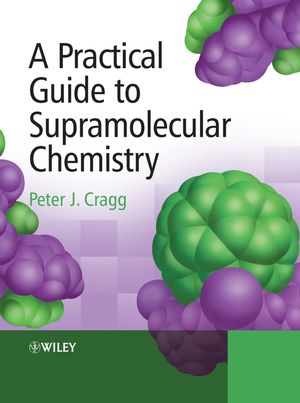A Practical Guide to Supramolecular ChemistryISBN: 978-0-470-86654-2
Paperback
216 pages
November 2005
 This is a Print-on-Demand title. It will be printed specifically to fill your order. Please allow an additional 10-15 days delivery time. The book is not returnable.
Other Available Formats: Hardcover
|
||||||
Preface ix
Introduction 1
1 Linear components for supramolecular networks 9
1.1 Flexible components 9
1.2 Rigid components from Schiff bases 17
1.3 Flexible tripods 19
1.4 Simple anion hosts 23
1.5 Rigid platforms 30
2 Cyclic synthons 35
2.1 Planar macrocycles from nature 35
2.2 Artificial planar macrocycles – phthalocyanines and other cyclic systems 37
2.3 Serendipitous macrocycles 43
2.4 Adding functionality to the crowns 46
2.5 Azacrowns with sidearms 51
2.6 Water-soluble macrocycles 55
2.7 Catenanes and rotaxanes 60
3 Molecular baskets, chalices and cages 69
3.1 One for beginners 69
3.2 Calixarenes – essential supramolecular synthons 71
3.3 Adding lower rim functionality to the calixarenes 77
3.4 Adding upper rim functionality to the calixarenes 80
3.5 Oxacalix[3]arenes 84
3.6 Oxacalixarene derivatives 91
3.7 Azacalix[3]arenes 99
3.8 Calixarene variations 102
3.9 Molecular cages for cations and anions 107
4 Supramolecular assembly 115
4.1 Detection, measurement, prediction and visualization 115
4.2 X-ray crystallography 115
4.3 Spectroscopic and spectrometric techniques 120
4.4 Binding constant determination 122
4.5 Solid state vs. solution behaviour 127
4.6 Supramolecular chemistry in silico: molecular modelling and associated techniques 127
4.7 Computational approaches 129
4.8 A protocol for supramolecular computational chemistry 141
4.9 Examples of in silico supramolecular chemistry 142
5 Supramolecular phenomena 161
5.1 Clathrates 161
5.2 Stabilization of cation–anion pairs by crown ethers: liquid clathrates 162
5.3 Receptors for the ammonium ion 168
5.4 Purification of fullerenes 170
5.5 Making molecular boxes and capsules 172
5.6 Self-complementary species and self-replication 176
Appendix 1 Integrated undergraduate projects 185
Appendix 2 Reagents and solvents 189
Index 197



